David Cameron wants nurses' pay to be tied to how well they look after patients as part of changes to banish poor care in the NHS in response to the devastating findings of a report published on Wednesday into the Mid Staffordshire hospital scandal.
The prime minister told MPs the change should reward nurses who provide excellent care as the government began considering the 290 far-reaching recommendations set out by inquiry chairman, Robert Francis QC, to improve patient safety and overhaul what he called a flawed, self-serving "NHS system".
Cameron identified the NHS's 300,000 nurses as the key group of health professionals to improve patients' experience of the service. He pledged to respond to Francis's proposals within a month but also backed a shakeup of nurses' salaries as one of a number of moves that need to be made without delay, alongside appointing a first chief inspector of hospitals to investigate where concerns have been raised.
"There are some simple but profound things that need to happen. Nurses should be hired and promoted on the basis of having compassion as a vocation and not just academic qualifications," Cameron said.
"We need a style of leadership from nurses which means poor practice is not tolerated and is driven off the wards. And another issue is whether pay should be linked to quality of care rather than just time served at a hospital. I favour this approach," he added.
The sweeping changes that Francis recommended also included:
Regulation of the NHS's 800,000 healthcare assistants, who carry out much of the basic hands-on patient care.
A ban on hospitals forcing staff who leave to sign "gagging clauses".
NHS managers and bosses to have to join a registration scheme and face disqualification if they fail to deliver good care, as well as a new fit and proper persons test.
A legal "duty of candour" compelling NHS staff to admit to mistakes.
The closure of hospital units where concerns about safety are raised.
Francis's report found that an array of local and national NHS organisations, including the system's regulators, failed to detect or stop neglectful and dangerous care provided to patients from 2005 to 2009 at Stafford hospital. Between 400 and 1,200 patients are estimated to have died during that time as a result of suffering neglect, misdiagnosis, poor hygiene and callous treatment.
Francis lambasted the "appalling and unnecessary suffering" inflicted by hospital staff but also declared that those victims "were failed by a system which ignored the warning signs and put corporate self-interest and cost control ahead of patients and their safety".
On a difficult and fast-moving day for the health service, relatives of some of the scandal's victims said the NHS chief executive, Sir David Nicholson, should resign and voiced anger at Cameron's insistence that he should not become a "scapegoat". They were also disappointed that Francis had urged changes to organisations but not sacking or punishing individuals as the best way to prevent such a care scandal from happening again.
Cure the NHS, the campaign group founded by the relatives, wants Nicholson out because they say he did far too little to investigate Stafford hospital when he ran the regional NHS strategic health authority until early 2006. Tory MP Chris Skidmore also raised with Cameron Nicholson's description of Cure the NHS in 2008 as a "lobbying" organisation whose views did not represent widespread concern. Nicholson did not recall making those remarks, Francis's report said.
"David Nicholson presided over a regulator authority that was supposed to be monitoring Mid Staffordshire trust at a time when people were dying needlessly. He failed in his responsibility as head of that regulator body, and was rewarded for failure with a top job in the NHS. He should do the honourable thing and resign," said Frank Robinson, whose son, John Moore-Robinson, 20, bled to death in 2006 after a junior doctor in Stafford's A&E unit misdiagnosed a ruptured spleen as bruised ribs.
Although Francis urged ministers to press ahead with implementing his proposals, there are already signs that some are unlikely to become policy by the time the government finalises its response.
Serious doubts have emerged about Francis's key proposal that the Care Quality Commission should become an NHS super-regulator, taking over responsibility for scrutinising hospitals' financial as well as clinical performance, in a move that would seriously reduce the role of Monitor, which is due to become the service's economic regulator in April.
Whitehall sources said the idea was impractical, given the CQC's existing heavy workload, and pointed to its rejection by the Commons health select committee in 2011. David Prior, the CQC's chairman, told the Guardian his body did not want to merge with Monitor and instead wanted to conduct more joint inspections with it as part of a beefed-up programme of hospital scrutiny.
Cameron also announced that Labour MP Ann Clwyd, who has castigated the NHS's care of her husband as he lay dying in a hospital in Cardiff last year, would jointly lead a review of how the health service handles complaints – which Francis identified as a service-wide problem. He has also commissioned Professor Sir Bruce Keogh, the NHS's medical director, to undertake an immediate investigation into the hospitals in England with the highest mortality rates. His investigation will initially focus on five hospital trusts – in Colchester, Tameside, Blackpool, East Lancashire and Basildon and Thurrock – that have posted poor mortality results for the last two years, based on summary hospital-level mortality indicator data, which is one of several ways of examining death rates among patients after hospital treatment.
Cameron also signalled strong support for the recommendation that doctors, nurses, hospital managers and board directors should face criminal charges if they are responsible for failings in care.
Francis foreshadowed a huge increase in the risks faced by NHS organisations and health professionals when he suggested that "to cause death or serious harm to a patient by non-compliance with fundamental standards should be a criminal offence".
The prime minister voiced frustration that, almost six years after the Mid Staffs scandal emerged, and despite four previous inquiries revealing appalling care, no doctor or nurse had been struck off by either of their respective regulators, the General Medical Council and Nursing and Midwifery Council. Both bodies needed to strengthen their ways of holding those they police to account, and the NMC's "outdated and inflexible decision-making processes" need to be urgently replaced, Cameron added.
And he echoed the health secretary Jeremy Hunt's determination to impose a tough new inspection regime on hospitals modelled on those Ofsted already conducts in schools as part of a major drive to "purge the culture of complacency that is undermining the care in our country".
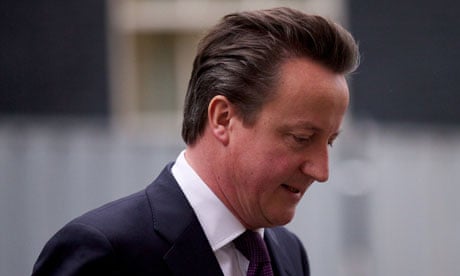
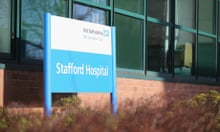
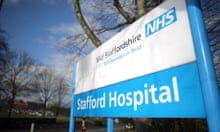


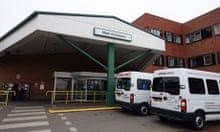
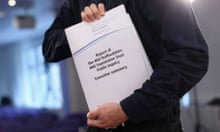
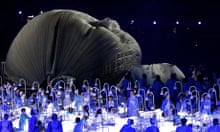

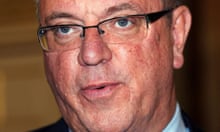
Comments (…)
Sign in or create your Guardian account to join the discussion